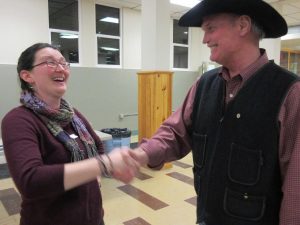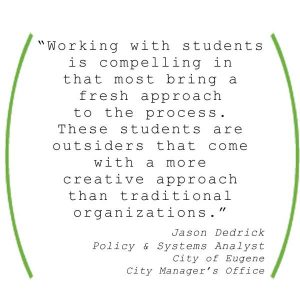Partnering with CPW
 CPW projects are a win-win for communities and students: communities get professional quality work at a cost-effective price while students receive real world planning experience and academic credit.
CPW projects are a win-win for communities and students: communities get professional quality work at a cost-effective price while students receive real world planning experience and academic credit.
Each academic year, CPW works with 10 – 15 communities around the state on planning and policy projects. The process starts with a conversation between the community lead and a CPW faculty or staff member about the scope of work and allocated budget. Once this is defined, next steps include a proposal review and approval, project implementation, and contract execution. Because CPW is a funded primarily through grants and contracts with communities and agencies, fees are structured on a cost recovery basis.
CPW’s Approach
CPW utilizes a three tiered approach to project management:
- First year graduate students work in teams on projects;
- Second year graduate employees (GEs) serve as the day to day project managers and handle many of the project logistics and work with the graduate student teams;
- CPW faculty and staff oversee all projects, ensure high quality products, and contract execution.
 Proven track record of delivering high-quality planning and policy products to Oregon communities
Proven track record of delivering high-quality planning and policy products to Oregon communities
Although most of our work is completed while CPW class is in-session (January-June), CPW’s unique structure easily accommodates year-round project work as well. Graduate students, who have excelled in the CPW class, are hired during fall and summer months to finish projects, began new ones, or work on smaller-scaled projects that can be completed over a few months. CPW faculty and staff work year-round to ensure project consistency and maintain project continuity.
CPW faculty are certified professional planners and have extensive experience in a broad range of focus areas including:
- Natural Resources
- Equity & Human Rights
- Community & Economic Development
- Natural Disasters & Community Resilience
- Food Systems
- Transportation
- Parks, Recreation & Open Spaces